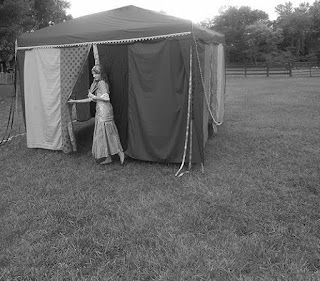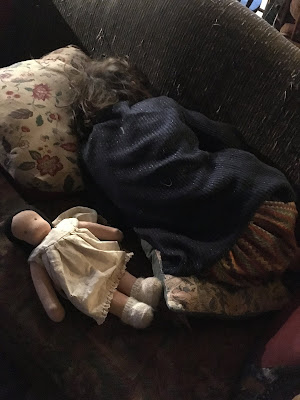The Rich Fool and His Storage Bins
In my
quest for Lady Poverty, I turned to the Scripture, that treasure trove in worn
covers with tissue-thin pages. What do we read there about wealth, and how has
the Church interpreted it? This last is crucial since not every teaching about
money is clear in the Scripture, and the balance – for as Chesterton pointed
out, the Church is performing a balancing act perfectly poised – is everything
for the understanding.
Money
and sex are two sources of selfishness in marriage, and in the wider culture as
well. My friend the radical iconographer is fond of saying that Christ spoke
little about sex but very much about the rich. Our culture is obsessed with
sex, forcing Mother Church to constantly turn her attention to it, but we would
much rather not talk about money, because it’s far too important to the way we
live. Thanks to disagreements and misunderstanding about sex, the Church has
responded with the Theology of the Body. So perhaps it’s time for Catholics to
turn our attention to the problem of money.
I
have spoken of how Christ began His public preaching by blessing Poverty in the
Sermon on the Mount in Matthew’s Gospel. Luke’s Gospel narrates the
lesser-known “Sermon on the Plain,” which features a different version of the
Beatitudes in chapter 6, verses 20-22. Here, Christ blesses the poor, and after
his four blessings: blessing those who are poor, hungry, mourning, and
persecuted, He lists four “woes.”
“Woe to you who
are rich, for you have had your consolation.
“Woe to you who are full now, for you shall hunger.
“Woe to you who laugh now, for you shall mourn and weep.
“Woe to you when men speak well of you,
for such their fathers did to the false prophets.”
(Luke 6: 24-26.)
“Woe to you who are full now, for you shall hunger.
“Woe to you who laugh now, for you shall mourn and weep.
“Woe to you when men speak well of you,
for such their fathers did to the false prophets.”
(Luke 6: 24-26.)
Note the
nuance in our Savior’s words: he does not curse the rich, like the Marxist who
considers the rich intrinsically evil. Christ only warns them of coming woe,
“for you have already had your consolation.”
Six
chapters later, Christ tells his disciples the parable of the rich fool in the
midst of a sermon given to his disciples “in the midst of the multitudes.” He
begins by warning of the leaven of the Pharisees, namely, hiding sin, continues
with a warning not to fear those who can kill the body but not the soul, and to
trust in the loving attention of God, who has numbered the very hairs of our
head. He admonishes His followers to be brave in the face of persecution, and
not to be anxious about what to say when put on trial. Then there is an
interruption. One of the multitude interrupts this intense sermon with a purely
worldly concern that must have struck the audience as frankly, off topic:
“Teacher, bid my brother to divide the inheritance with me!” (Luke 12:13) Now,
disputes among brothers in the Scriptures tend to have bloody and catastrophic
consequences, recalling Cain and Abel, Jacob and Esau, Joseph and his brothers,
and so on. So here our Savior is
confronted with a perilous and possibly murderous situation: a question of
inheritance voiced by an anonymous bystander.
Jesus
expresses skepticism that the man will listen to the advice given: “Man, who
has made me a judge or divider over you?”
In the same way, many Christians who call our Savior Lord sometimes
resist calling him Judge or Divider when it comes to the material possessions
of this world. So Christ does not judge
the man’s claim and leaves the injustice unsolved. “Take heed, and beware of
all covetousness, for a man’s life does not consist in the abundance of his
possessions.”
He then tells
a parable, which seems to be His tactic when He senses a straight answer will
be rejected.
“The land
of a rich man brought forth plentifully, and he thought to himself, ‘What shall
I do, for I have nowhere to store my crops?’ And he said, ‘I will do this: I
will pull down my barns and build new ones; and there I will store all my grain
and my goods. And I will say to my soul, ‘Soul, you have ample goods laid up
for many years; take your ease. Eat, drink, and be merry.’ But God said to him,
‘Fool! This night your soul is required of you; and the things you have
prepared, whose will they be?’ So is he who lays up treasure for himself and is
not rich towards God.” (Luke 12:16-21)
It is not
clear that the rich man ever put his plans into action: pulling down his barns,
building new ones, storing his grain and goods, and then enjoying a life of
ease. It might have been one night’s fantasy of the future, vanished in the
morning over his cold corpse. God corrects the perspective of the rich fool:
his goods are not his and were not given to be stored indefinitely in his barns
but were meant for others. The resulting
sloth which the rich man entertained, led him into illusion, a fantasy shattered
by his death (and one presumes, damnation) that very night.
The
rich fool’s mistake was twofold:
1. He forgot the poor when he was
considering what to do with his abundance.
2. He piled up wealth – hoarded, we
might say –instead of giving it away.
Had he
solved his storage problem by sharing, perhaps with his brother, both would
have been satisfied and he might not have died. If Christ or an outside judge
or government official had demanded that he share his wealth, the wealth might
have left his storage bins but remained stored in his heart, just as it was
stored in the eyes of his envious brother. Hence, Wisdom being wiser than the
government, Christ declines to command that the rich brother share his wealth.
His
parable might seem to agree with the questioner, who believes his problems are
caused by the ungenerous nature of his brother. One senses the angst of the
social justice warrior contemplating the rich capitalist. But Christ warns that
redistribution of wealth is not an impossible socialist dream: on the contrary,
redistribution of wealth is as inevitable as death. The piled-up wealth will
then belong to someone else, possibly the angry brother. But the problem
remains, a deadly problem.
Take heed
and beware! Pay attention! Life does not
consist in an abundance of possessions. If the questioner is about to be
“rewarded” by the death of his inheriting brother, he is still rebuked for
believing that lack of money is his crucial problem. The eyes and soul of the
questioner are possessed by the abundance of his brother’s wealth and the
corresponding lack in his own wealth. He demands that Christ be “fair” and give
each an equivalent amount. But neither greed nor envy will be solved by mere
equality.
The
parable reminds us that “ownership” is a legal fiction created for the ordering
of society, transferable and destructible by the whim of the weather,
governments, human will, and the Lord God.
To whom will all this piled-up wealth go?
Since we
cannot keep them, only steward them, what is the purpose of goods? Let me step from the parable to my little
home.
One sees
the purpose in a large bag of oatmeal, more oatmeal than an adult could
comfortably eat in any one sitting – when one is faced with the hungry faces of
children. Watching a baby, barely eighteen months, toddle to a footstool, sit
at the battered coffee table by the kitchen counter, clutching a tiny spoon,
all eyes and empty stomach, see the lowered blue bowl of steaming
brown-sugar-sweetened goodness set before them, patting their hands (still
spoon clutching) in a hurried mumble of grateful prayer – and the focused
concentration on putting the spoon into the oatmeal and – finally!—to the
little mouth – that, my readers, is the purpose of oatmeal. That is why the
Lord God created galaxies and planets and continents and governments and houses
and factories and pottery and metal and oatmeal—for that moment where the
hungry mouth is fed, and love is given, and the universe rejoices to see a
baby’s hunger satisfied by good food. This is the purpose of goods, for the
hungry to be fed, the naked clothed, the weeping comforted.
Oatmeal by
the ton stored in some cellar against some future catastrophe—is it an
illusion? Is the wealth better spent being sent to the hungry mouths here and
now? What balance can be struck between
prudence and selfishness, generosity and grandiose pride? How much does one store up? How much should
one give? In order to do so, one must
identify both the envious questioner and the rich fool in one’s own heart and
put the problem in perspective before the Lord God.
One might
begin by inviting Christ to take the role deferred and be the judge and divider
of our possessions. Much to the scandal of the socialist who swoons at for
fascist power, Christ does not command. He waits to be invited, asking us not
to remain bystanders in the multitude, but to put everything at His feet and
follow Him.
Christ
follows this parable with the exhortation to be like the ravens who neither sow
nor reap nor gather into storehouses or barns, but yet God feeds them! And how
much more valuable are we to God! Worrying does not add an inch to our span of
life, He reminds us. Those who worry, like the rich fool, forget Who truly
measures our days.
He reminds
us the lilies are clothed with more glory than Solomon’s, even though the
lilies are mere grass which is thrown into the oven in a day, and we of little
faith should not fret about our clothing. “Do not seek what you are to eat and
what you are to drink, nor be of anxious mind. For all the nations of the world
seek these things; and your Father knows you need them. Instead, seek His
kingdom and these things will be yours as well. Fear not, little flock, for it
is your Father’s good pleasure to give you the kingdom. Sell your possessions
and give alms, provide yourselves with purses that do not grow old, with a
treasure in the heavens that does not fail. For where your treasure is, there
will be your heart also.” (Luke 12:22-34)
I have a
large family, and storage bins are a grubby necessity in my life, but this
parable has given me pause when considering buying new ones. It has started me
on a search for limits: for limits of a human size, parameters which can help
perfect my soul. I keep my storage small, and when I outgrow it, I search for
ways to give away what I have rather than expanding what I’m able to hold on
to. This is not just minimalism or even convenience: the parable of the rich
fool teaches me it’s about saving my soul. I will outline this further as we go
on. But I merely want to point out the reverse of the parable: limits are a way
of ensuring generosity and living lightly can keep us light of heart.



Comments